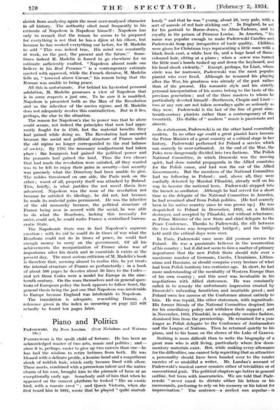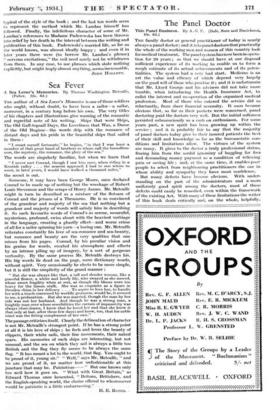Piano and Politics
' 18s.)
PADEREWSKI is the spoilt child of fortune. He has been an acknowledged master of two arts, music and politics; and— since it is, perhaps, easier to give up two careers than one—he has had the wisdom to retire betimes from both. He was blessed with a delicate profile, a leonine head and a magnificent shock of reddish hair, which early became lined with silver. These assets, combined with a precocious talent and the native charm of his race, brought him to the pinnacle of fame at an exceptionally early age. Somebody said of him that when he appeared on the concert platform he looked "like an exotic bird, with a roseate crest " ; and Queen Victoria, when she first heard him in 1891, wrote that he played "quite Marvel- lously " and that he was "young, about 28, very pale, with a sort of aureole of red hair sticking out" In England, he at for his portrait to Burne-Jones, to Alma-Tadema„ and to royalty in the person of Princess Louise. In America, "his name was popular enough to make Paderewski Candies and Paderewski Soap pay irrespective of tneir quality. Children were given for Christmas toys representing a little man with a black frock coat, a white bow tie, and a huge head of flame- coloured hair, sitting at a piano ; when a screw was turned the little man's hands rushed up and down the keyboard, and his head shook violently." Except, perhaps, for Liszt, whose circle was far narrower, Paderewsld was the most popular pianist who ever lived. Although he resumed his playing after the War, his greatness was already of the past rather than of the present. His romantic style and his strictly personal interpretation of his scores belong to the taste of the previous generation ; and of the three masters to whom he particularly devoted himself—Beethoven, Chopin and Liszt— two at any rate are not taken nowadays quite so seriously as they were. Paderewski is the last of the line of great nine- teenth-century pianists rather than a contemporary of the twentieth. His dislike of" modem" music is passionate and sincere.
As a statesman, Paderewski is on the other hand essentially modern. In no other age could a great pianist have become the Prime Minister of a great country at a critical stage in her history. Paderewski performed for Poland a service which can scarcely be over-estimated. At the end of the War, the Poles were dangerously divided into two factions. The Polish National Committee, in which Dmowski was the moving spirit, had done manful propaganda in the Allied countries for the Polish cause, and had won the ear of the Allied Governments. But the members of the National Committee had no following in Poland ; and, above all, they were cordially detested by Marshal Pilsudski, already well on his way to become the national hero. Paderewski stepped into the breach as mediator. Although he had served for a short time as the delegate of the National Committee in America, he had remained aloof from Polish politics. (He had scarcely been in his native country since he was grown up.) Ile was despatched to Poland in December, 1918, on a British destroyer, and accepted by Pilsudski, not without reluctance, as Prime Minister of the new State and chief delegate to the Peace Conference. Thanks to Paderewski, the rift between the two factions was temporarily bridged ; and the bridge held until the critical days were over.
In Paris, Paderewski once more did yeoman service for Poland. He was a passionate believer in the resurrection of his country ; but it did not seem to him a matter of primary importance that the new Polish State should rule over a maximum number of Germans, Czechs, Ukrainians, Lithua- nians and Russians, or should comprise every hectare of what had been Polish territory two centuries ago. In short, he had more understanding of the mentality of Western Europe than of his own country ; and this asset was invaluable in his negotiations with Allied statesmen. He was constantly called in to remedy the unfortunate impression created by Dmowski's unbending fanaticism and insatiable greed ; and Poland owes her success at the Conference almost entirely to him. He was repaid, like other statesmen, with ingratitude. His former friends of the National Committee despised him for his conciliatory policy and withdrew their support ; and in November, 1919, Pilsudski, in a singularly cavalier fashion, dismissed him from the premiership. He remained for a year longer as Polish delegate to the Conference of Ambassadors and the League of Nations. Then he returned quietly to his piano, and to his home on the shores of the Lake of Geneva.
Nothing is more difficult than to write the biography of a great man who is still living, particularly where few docu- mentary materials exist. But, while making every allowance for the difficulties, one cannot help regretting that so attractive a personality should have been handed over to the tender mercies of so unskilful a writer. Mr. Landau's account of Paderewski's musical career consists either of trivialities or of conventional gush. The political chapters are better in general outline, but teem with inaccuracies. We are told that Pade- rewski "never eared to dictate either his letters or his memoranda, preferring to rely on his memory or his talent for improvization." The sentence—a perfect non sequitur—is
typical of the style of the book ; ahd the last ten words seem to represent the method which Mr. Landau himself has followed. Finally, the infelicitous character of some of Mr. Landau's references to Madame Paderewska has been thrown into relief by her death in the interval between the writing and publication of this book. Paderewski's married life, so far as the world knows, was almost ideally happy ; and even if in later years there were (to borrow Mr. Landau's phrase) "nervous excitations," the veil need surely not be withdrawn from them. In any case, to use phrases which state nothing explicitly, but might imply almost anything, seems inexcusable.
Jonw HALLErr.









































 Previous page
Previous page